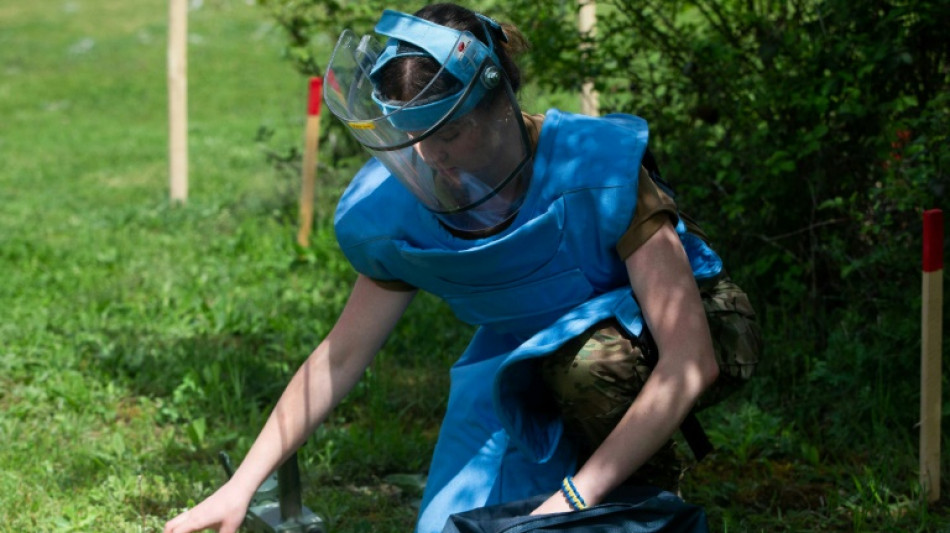
-
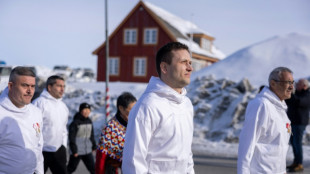 Greenland PM visits Denmark as Trump threats loom
Greenland PM visits Denmark as Trump threats loom
-
Philippines, US test air defences as China seizes reef
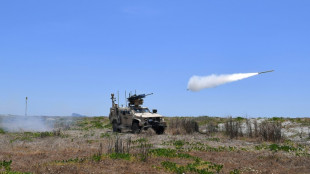
-
 25 killed, fires still burning in huge Iran port blast
25 killed, fires still burning in huge Iran port blast
-
India and Pakistan troops exchange fire in Kashmir

-
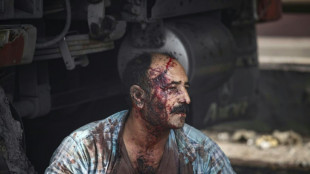 Eighteen killed, fires still burning in huge Iran port blast
Eighteen killed, fires still burning in huge Iran port blast
-
No handshake at muted India-Pakistan border ceremony

-
 Maligned by Trump, White House reporters hold subdued annual gala
Maligned by Trump, White House reporters hold subdued annual gala
-
Austria trials DNA testing to uncover honey fraud

-
 Trump trade war pushes firms to consider stockpiling
Trump trade war pushes firms to consider stockpiling
-
D'Backs' Suarez becomes 19th MLB player to hit four homers in one game

-
 Continuity or rupture: what direction for the next pope?
Continuity or rupture: what direction for the next pope?
-
Surridge scores four as Nashville smash seven past Chicago

-
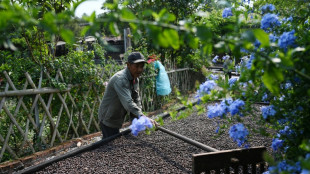 Chinese tea hub branches into coffee as tastes change
Chinese tea hub branches into coffee as tastes change
-
Diplomacy likely to trump geography in choice of new pope

-
 All eyes turn to conclave after Pope Francis's funeral
All eyes turn to conclave after Pope Francis's funeral
-
Doves, deaths and rations: Papal elections over time

-
 Progressive Canadians say social issues blown off election agenda
Progressive Canadians say social issues blown off election agenda
-
Liverpool primed for Premier League title party

-
 Buenos Aires bids farewell to Francis with tears, calls to action
Buenos Aires bids farewell to Francis with tears, calls to action
-
Thunder sweep past Grizzlies in NBA playoffs, Cavs on brink

-
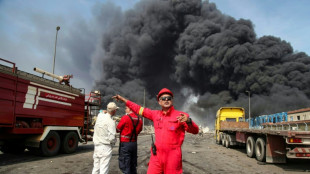 Major blast at Iran port kills 14, injures 750
Major blast at Iran port kills 14, injures 750
-
'What we live for': Kounde after winning Barca Copa del Rey final

-
 More McIlroy magic at PGA pairs event but Novak and Griffin lead
More McIlroy magic at PGA pairs event but Novak and Griffin lead
-
Fire rages after major blast at Iran port kills 14, injures 750
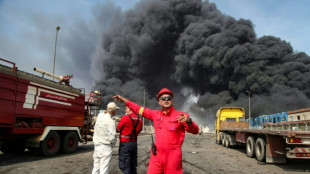
-
 Denkey wonder-strike keeps Cincinnati on track in MLS
Denkey wonder-strike keeps Cincinnati on track in MLS
-
Barca edge Real Madrid in extra-time to win wild Copa del Rey final

-
 'Legendary' Eubank Jr beats Benn in grudge bout
'Legendary' Eubank Jr beats Benn in grudge bout
-
Thunder sweep past Grizzlies into NBA playoffs 2nd round, Cavs on brink

-
 South Korea's Ryu and Japan's Saigo share LPGA Chevron lead
South Korea's Ryu and Japan's Saigo share LPGA Chevron lead
-
Canada leaders make closing pitches in campaign upended by Trump

-
 De Bruyne's Man City exit 'so difficult' for Guardiola
De Bruyne's Man City exit 'so difficult' for Guardiola
-
'No regrets' for Amorim over Man Utd move

-
 Lyon and Strasbourg win to close in on Europe, Montpellier relegated from Ligue 1
Lyon and Strasbourg win to close in on Europe, Montpellier relegated from Ligue 1
-
Toulouse thrash Castres as Top 14 pursuers stumble

-
 Djokovic crashes to nervous Arnaldi in Madrid opener, Swiatek advances
Djokovic crashes to nervous Arnaldi in Madrid opener, Swiatek advances
-
Olympic champs Russell, Davis-Woodhall win at Drake Relays

-
 Browns end Sanders long draft slide
Browns end Sanders long draft slide
-
Cavs crush Heat, on brink of NBA playoff sweep

-
 Fire rages after major blast at Iran port kills 8, injures hundreds
Fire rages after major blast at Iran port kills 8, injures hundreds
-
Kiwi Beamish wins Penn Relays 1,500m crown with late kick

-
 Mbappe on Real Madrid bench for Clasico Copa del Rey final
Mbappe on Real Madrid bench for Clasico Copa del Rey final
-
England survive France fightback to seal Women's 6 Nations slam

-
 Palace sweep past Villa to reach FA Cup final
Palace sweep past Villa to reach FA Cup final
-
CAF appoint Moroccan Lekjaa first vice-president

-
 Major blast at Iran port kills 5, injures hundreds
Major blast at Iran port kills 5, injures hundreds
-
Rodgers vows to stay with Celtic after fourth successive Scottish title

-
 Ipswich relegated as Newcastle, Chelsea boost top five bids
Ipswich relegated as Newcastle, Chelsea boost top five bids
-
Canada leaders make final pitches in campaign upended by Trump

-
 Mullins -- Ireland's national training treasure
Mullins -- Ireland's national training treasure
-
US, Iran say progress in 'positive' nuclear talks


'Not afraid': Ukraine women learn to demine in Kosovo
Kateryna Grybinichenko chose to sign up after rockets fell on her home city of Sloviansk, in Ukraine's eastern Donetsk region.
The 36-year-old wanted to help -- so she joined a band of Ukrainian women taking part in an intensive demining course in Kosovo, a place all too familiar with clearing deadly explosives.
The trainees have travelled hundreds of miles, hoping to protect their homeland for decades to come.
After learning their craft from the experts, the women plan to return to Ukraine and put it into practice in areas where Russian troops have withdrawn.
"There are various ways to fight," said Anastasiia Minchukova, one of the eight women who applied for the scheme.
The 20-year-old English teacher, who dons a blue protective apron and a visor for the training, said there is a "huge demand for people who know (about) demining" in Ukraine.
"The only reason I'm here is to help my country," she said.
The trainees are being taught how to detect, identify and disable explosives on the course organised by the Mines Awareness Trust (MAT) Kosovo NGO.
Six women started the three-week programme in the western town of Peja, known as Pec to Serbs, on Monday, with two others set to arrive soon. The organisers plan to take on more trainees in the future.
The course has been specifically set up in response to the invasion of Ukraine, and focuses on Russian and former Soviet arms, including guided weapons, mines and rockets.
It is open to men too, but Ukrainian males aged 18 to 60 are banned from leaving the country. And the women here want to take part in the defence of Ukraine.
The MAT said this course is the first of its kind outside Ukraine since the Russian invasion began in February.
- 'First-hand experience' -
Kosovo was chosen to host the scheme because of its "first-hand experience", chief instructor Artur Tigani said.
"We have gone through quite a similar situation, especially when it comes to contamination with unexploded devices."
An estimated 13,000 people lost their lives in the war between Serbian forces and ethnic Albanian guerrillas in the late 1990s.
The conflict ended after a NATO air campaign forced Serbian troops to withdraw from the territory, paving the way for independence in 2008.
But the war left the former Serbian province with 4,500 minefields, according to US estimates after the war.
The devices were scattered mainly in the mountainous Peja region, close to the Albanian border, where Tirana shipped arms and supplies to Albanian guerrillas.
With international help, most of the mines have been cleared, and the risk is now officially assessed as "light".
The Kosovo instructors have also delivered training in Syria, Iraq and Libya.
"It is our life's mission to save lives and help others save lives," said Tigani.
- Huge challenge -
The Ukrainian trainees are aware of the huge challenge they face when they get back home.
They expect to join emergency services and get to work when they return on May 13.
"I've seen, while travelling in (Ukraine), the huge amount of the abandoned ammunition and unexploded ordnance laying on the ground," Grybinichenko said.
It is thought it could take decades to rid Ukraine of mines. Perrine Benoist, of the Handicap International NGO, has said it will likely "take 50 years to clear everything."
Minchukova knows that she and her fellow trainees have taken on a perilous task.
But she said: "It's dangerous all over Ukraine, even if you are in a relatively safe region".
"I'm ready for it. I'm a Ukrainian. I'm not afraid of anything.
"I know we will have a chance to prove (we are) worthy of doing the same as men."
P.Silva--AMWN